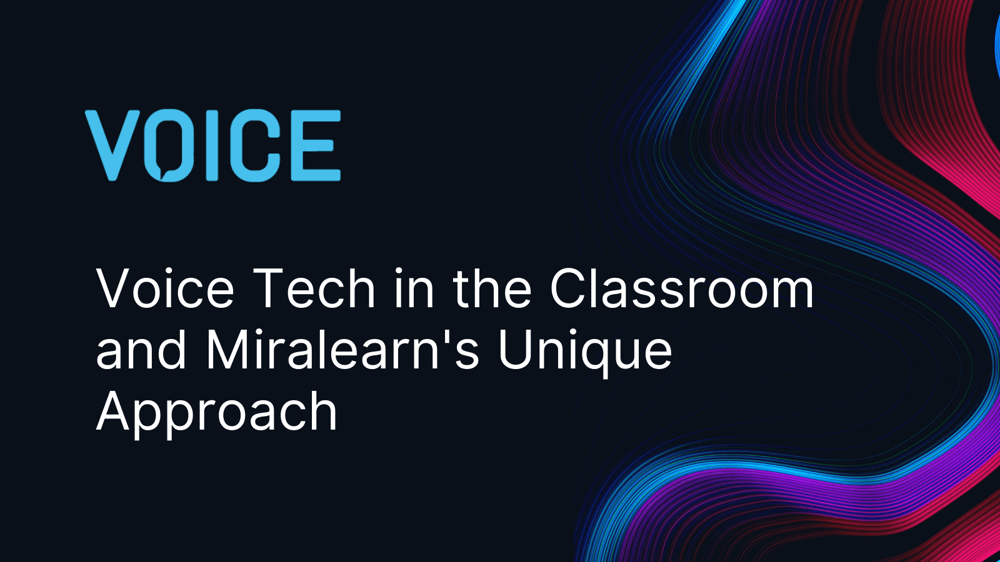Voice Tech in the Classroom and Miralearn's Unique Approach
Modev News VOICE Summit 22-04-11 Modev Staff Writers 4 min read

Technological innovation is disruptive insofar as it tends to change how we do things. Washers and dryers altered the way we do laundry; cars changed how we travel, and refrigerators changed how we store food.
Voice tech is no different. While it's still nascent tech and isn't as widespread as washers, dryers, cars, and fridges, voice tech is disruptive too. It provides new ways of finding information, doing business, ordering food, and manipulating household devices (voice-enabled devices). The adoption of voice tech has been on a constant rise for years now - and that tendency shows no sign of slowing down. In fact, the opposite is true: it's accelerating.
The above is pretty much uncontroversial, insofar as it describes voice tech's growth in the commercial space. But what about voice tech in education, in the classroom? While the adoption of voice tech in the classroom has grown somewhat, it's still rather timid when compared to commercial use.
The limited use of voice assistants in the classroom so far has yielded some benefits. They were shown to keep the class well-behaved when the teacher was away. They also appear to have raised the engagement level of autistic students. And the devices were also found to help some students, who see the vocal assistant more engaging than paper books, with math and science.
The benefits are still somewhat limited because smart assistants were initially designed for consumer use rather than educational use. Smart assistants are primarily used to automate everyday tasks like turning the heating, lights, or air conditioning on and off. They're used to make online purchases, cue up playlists, and send text messages and emails. In a nutshell, they're mainly leisure devices that are not optimized for educational use.
But while that may be true, one company has taken a different approach to voice AI in education. Indeed, Switzerland-based Voice AI startup, Miralearn, has taken stock of the above and has opted for a more personal and student-centric approach to educational use of voice technology - and the results are impressive.
A New Approach to a New Way of Learning
Most educational experiences regarding voice tech have revolved around having a voice assistant in the classroom - basically a smart speaker with which the class and the teacher could interact. But that approach isn't optimal as a smart assistant sharing its resources across an entire classroom will inevitably be more of a novelty than a proper education tool.
Enter Miralearn.
Miralearn decided to make its voice-based learning experiences more personal and focused. Rather than simply dropping a smart assistant in the classroom, Miralearn developed a suite of learning apps that integrate voice AI and with which children interact on a one-on-one basis.
That means the AI is 100% focused on the pupil, not the classroom. That makes the experience much more personal and tailored to the child's needs. Suppose a child is engaging with a reading app. As they read through the text, if they have difficulty reading or pronouncing a word, the AI will pick up on that immediately and provide help and support to the child. And as they go through the various lessons, the AI learns where the child excels and where they have more difficulty - and it adapts to the child's learning needs. That's pretty powerful stuff.
Eggs for Every Basket
Miralearn's child-centric approach to voice AI in education isn't limited to its learning apps. Miralearn provides a suite of tools for teachers as well. The company offers a full-fledged learning platform, including a lesson planner and a smart assistant that provides lessons to students while enabling teachers to track their progress and forward instructions to their students in real-time. Also included in Miralearn's toolbox is a grading and assessment platform and a data-driven analysis platform, giving teachers the insights they need to adapt their learning content to the students' actual needs.
Miralearn's approach to voice tech in education isn't merely the result of their thinking outside the box. Miralearn built a new box altogether. Its innovative Ai-based learning platform proposes a paradigm shift regarding what it means to integrate voice AI in the classroom.
Its platform integrates tools for teachers and students. Rather than betting on a single gadget in the classroom, Miralearn provides a holistic learning experience that helps with planning, learning, grading, analyzing, and adapting the lessons for each pupil. And it uses voice AI where it's most valuable: in direct interaction with each child to teach them new skills while adapting to their needs.
The phrase 'don't just do it; do it right' would seem to describe Miralearn's philosophy. And we can't wait to see what they have in store for us moving forward.
About Modev
Modev was founded in 2008 on the simple belief that human connection is vital in the era of digital transformation. Today, Modev produces market-leading events such as VOICE Global, presented by Google Assistant, VOICE Summit, and the award-winning VOICE Talks internet talk show. Modev staff, better known as "Modevators," include community building and transformation experts worldwide. To learn more about Modev, and the breadth of events offered live and virtually, visit modev.com.